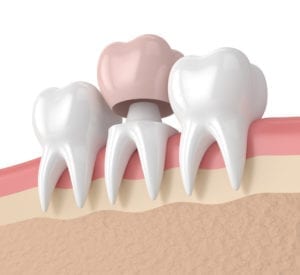Dr. Amy Marckese, a restorative dentist in Indianapolis, IN, prefers porcelain dental crowns for the most natural look and feel. Porcelain dental crowns are extremely well-fitting and virtually indistinguishable from natural teeth.
Dental crowns, also called dental caps or teeth caps, strengthen teeth, improving their function and overall esthetics. They are similar to porcelain veneers. Where porcelain veneers conceal only the front of a tooth, dental crowns cover the entire tooth like a cap. This enables crowns to improve both the appearance and strength of teeth.
Dr. Amy Marckese of DentalSpa in Indianapolis prefers porcelain dental crowns for the most natural look and feel. These crowns are extremely well-fitting and virtually indistinguishable from natural teeth.
Once considered less durable than metal crowns on teeth, porcelain crowns have shown excellent long-term results with proper treatment planning. In addition, metal-free dental crowns do not discolor the gum area like conventional metal dental caps. This is particularly important for teeth in the smile zone.
Studies have shown that amalgam fillings and metal crowns do not pose any health risks. However, many patients prefer metal-free dental fillings and crowns to ensure their mouths are healthy and beautiful.
Dr. Marckese also provides dental bridges to replace one or several lost teeth. Using the latest dental materials, your dental bridge is custom-made and color-matched to blend naturally with your smile. Dental bridges can be removable or fixed, often secured by dental implants for the best possible result.
Dental Crowns at DentalSpa

Dental crowns are among the most common dental treatments today. They offer cosmetic and restorative solutions for patients with various dental concerns.
Dental crowns can also be used to fix cracked teeth and crooked teeth, as well as other flaws:
- Replace worn or unsightly metal fillings
- Improve the appearance of stained or discolored teeth
- Correct misshapen or uneven teeth
- Restore tooth cavities or cover teeth after root canal therapy
- Repair cracked, worn, or broken teeth
- Restore dental implants
If you have old, broken, or worn dental crowns, you may be able to have them replaced with a new porcelain crown. Replacing dental crowns is a simple procedure that dramatically improves the smile’s appearance.
The Dental Crown Procedure: CEREC Crowns in One Visit
Initial Consultation & Examination – You will receive a comprehensive consultation and examination with Dr. Marckese regardless of your treatment. During this visit, she will inspect your teeth, gums, and mouth and determine if porcelain dental crowns suit you. Next, she will create a customized treatment plan to meet your cosmetic goals and address your health concerns.
Modeling – Dr. Marckese will fully explain your treatment and answer any questions you might have. You can view photos of other patients undergoing porcelain veneer treatment. She may use 2-D and 3-D renditions to show you what your teeth will look like after treatment.
Procedure: CEREC crowns are very strong, high-grade ceramic crowns. They are made quickly and easily, eliminating the need for a temporary crown and a second appointment. Dr. Marckese will begin treatment by preparing the tooth for the dental crown. Next, she will take a precise digital impression of your tooth using a 3D imaging system. These digital impressions are more accurate, less messy, less gaggy, and less invasive than traditional impressions.
We send the digital scan to the CEREC milling machine, which mills your crown right here in our office. Before cementing your crown, Dr. Marckese will check its fit, shape, and color. Once that is verified, the crown will be permanently cemented, and you will be on your way with your freshly made smoothie in hand!
After Care – Dental crowns require very little special care. Dr. Marckese will review the instructions and show you how to floss and brush properly. Routine dental cleanings and examinations are important to ensure long-term health and proper fit. Crowns are highly stain-resistant and will look bright for years to come.
Dental Crown FAQs
Dental crowns can treat almost any cosmetic or restorative dental issue. Learn more by reading the answers to these commonly asked questions.
How long does a dental crown last?
A dental crown can last 5 to 15 years, depending on the material used and how well you care for it. Porcelain crowns are more susceptible to wear and breakage than metal crowns, but they blend well with natural teeth. The lifespan of a crown also depends on your oral habits, such as avoiding chewing on hard objects or grinding your teeth. Regular dental checkups help ensure that your crown remains in good condition.
Does getting a dental crown hurt?
Getting a dental crown is usually not painful because the procedure is done under local anesthesia. You may feel pressure while the dentist shapes your tooth, but it shouldn’t cause discomfort. After the procedure, you may experience some sensitivity or mild discomfort as your gums adjust to the crown, but this usually goes away after a few days. If you experience severe pain, contact your dentist right away.
Can a dental crown help with tooth sensitivity?
A dental crown can help with tooth sensitivity, especially if the underlying tooth is damaged or exposed. The crown is a protective barrier, sealing the tooth and preventing further irritation from hot, cold, or sweet foods. If you have tooth sensitivity due to a cracked or decayed tooth, a crown can help alleviate the discomfort by covering the sensitive areas. However, if your sensitivity persists after the crown is placed, consult your dentist for further evaluation.
Can I eat normally with a dental crown?
Once the dental crown is placed and fully set, you should be able to eat normally with it. However, for the first few days after getting a new crown, it is recommended that you avoid chewing on hard foods, sticky substances, or anything that may put pressure on the crown. After the crown settles, you can resume your regular eating habits. If you experience discomfort or difficulty eating, consult your dentist for adjustments.
What should I do if my dental crown feels loose?
If your dental crown feels loose, it’s important to visit your dentist as soon as possible. A loose crown may indicate that the adhesive has worn down or that the underlying tooth has become damaged. Your dentist will assess the situation and may either re-cement the crown or recommend replacing it if necessary. In the meantime, avoid chewing on the affected side to prevent further damage.
Can dental crowns get cavities?
Dental crowns cannot get cavities because they are made from materials like porcelain, ceramic, or metal, which are resistant to decay. However, the tooth underneath the crown can still develop cavities if the crown doesn’t fit properly or if the seal between the crown and the tooth is damaged. This can allow bacteria to enter, leading to decay underneath the crown. Regular dental checkups are important to ensure that the crown is properly maintained and that no cavities form beneath it.
Dental Bridges at DentalSpa
A dental bridge bridges a gap between teeth to replace one or more missing teeth. While there are many dental bridges, Dr. Amy Marckese prefers a fixed one for the best long-term results.
Removable Dental Bridge vs. Fixed Dental Bridge
We provide two different kinds of dental bridges. At your consultation, we’ll help you determine the best choice for your needs.
Removable Dental Bridge
We only recommend a removable dental bridge if you need a short-term solution, such as maintaining tooth position while preparing for a fixed dental bridge or dental implant. Removable dental bridges are not a good long-term solution, and while they may be cost-effective initially, they frequently require replacement or repair down the road.
Fixed Dental Bridge
A fixed dental bridge is a prosthetic tooth connected to two dental crowns or implants. A dental bridge supported by dental implants offers better long-term benefits compared to supporting the bridge with a dental crown. Dr. Marckese will help you decide which treatment is right for you and offer the best long-term solution and esthetics.
Dental Implant vs. Dental Bridge
Compared to a dental bridge, a dental implant provides superior long-term results. Dental implants are arguably the best solution for replacing teeth because they are the closest thing to a natural tooth. Most people forget they have a dental implant.
Though they are considered an expensive, major surgical procedure, dental implants are an extremely conservative solution. Dental Implants are designed to last a lifetime and will require little to no cost for follow-up maintenance.
Dental Bridge FAQs
Dental bridges are ideal for replacing one or more consecutive missing teeth. Learn more.
How long do dental bridges last?
With proper care, dental bridges can last between 10 to 15 years. The longevity of a bridge depends on factors like the materials used, your oral hygiene habits, and whether you grind your teeth. Regular dental checkups are important to monitor the bridge’s condition and ensure the surrounding teeth remain healthy. If maintained properly, dental bridges can provide a long-term solution for replacing missing teeth.
Are dental bridges comfortable?
Dental bridges are generally comfortable once they are in place and properly adjusted. After the initial placement, you may experience mild discomfort or sensitivity as your mouth adjusts to the new bridge. Once you get used to it, most people find dental bridges very natural and functional, allowing them to chew, speak, and smile confidently. If you experience persistent discomfort, it’s important to consult your dentist to ensure the bridge fits properly.
Do dental bridges require special maintenance?
Dental bridges do not require special maintenance beyond regular brushing and flossing. However, cleaning around the bridge thoroughly is important, as plaque can accumulate underneath it. Your dentist may recommend specific cleaning tools, such as a bridge floss or an interdental brush, to help maintain oral hygiene. Regular checkups are essential to ensure the bridge remains in good condition and the surrounding teeth stay healthy.
Can I eat normally with a dental bridge?
Yes, once your dental bridge is in place, you should be able to eat normally. However, for the first few days, you should avoid chewing on hard or sticky foods while you adjust to the new bridge. After the initial adjustment period, you can resume eating as usual. Be mindful of biting into very hard foods, which could damage the bridge.
Will a dental bridge change my speech?
Dental bridges typically do not affect speech, especially once your mouth has adjusted to the new prosthetic. However, during the initial adjustment period, you may experience slight difficulty with certain sounds or speaking clearly. Your speech should return to normal once you get used to the bridge. If you continue to experience speech issues, visiting your dentist for a checkup is a good idea.
How can I tell if my dental bridge needs to be replaced?
Signs that your dental bridge may need to be replaced include discomfort, looseness, visible damage, or difficulty chewing. If the bridge is no longer fitting properly or the surrounding teeth show signs of decay, it may need to be replaced. Regular dental checkups are important to assess the bridge’s condition and ensure it continues functioning effectively. Your dentist can recommend replacement if necessary.
